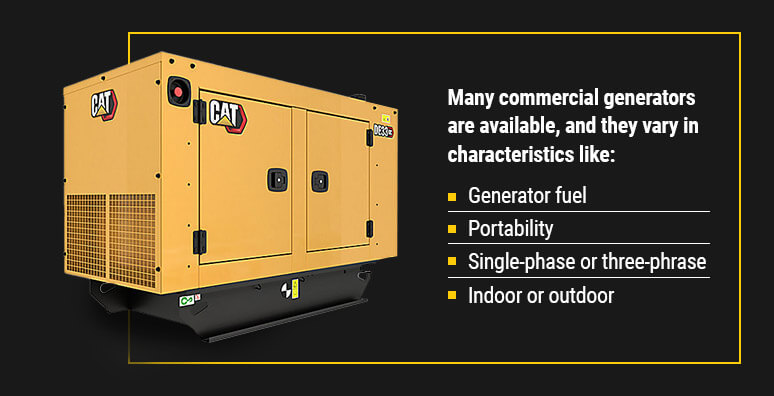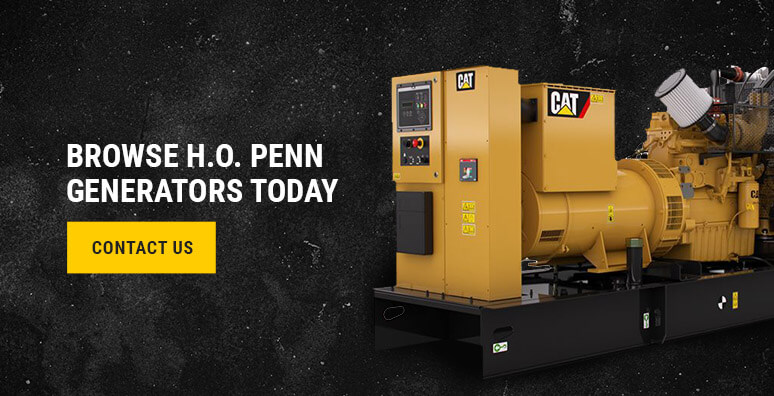
Jump To Sections:
- Determine the Wattage You Need
- Consider Your Environment
- Learn About Generator Options
- Seek Assistance
- Browse H.O. Penn Generators Today
The majority of companies rely on a power supply for daily business proceedings. Electricity allows your business to maximize efficiency each day, whether it’s powering elevators, computers or industrial tools.
Your company should have a backup power supply for emergencies. If you face a power outage, generators can provide power to crucial functions like elevators and security systems. Generators help you stay online, reducing the risk of data loss during a blackout.
Companies need to select the right size generator. If you choose the wrong size, the generator might not provide enough power, or you could waste money on excess electricity. Here is a guide on how to correctly size your generator.
1. Determine the Wattage You Need
The first step in selecting a commercial generator is determining your necessary wattage. Generators are available in a wide range of sizes and configurations, each tailored for specific wattage requirements. Whether you need power for an entire industrial plant or a set of computer-based operations, you can find the right wattage for your needs. The correct size depends on what your generator will typically power.
Here is an overview of how to calculate what size generator you need:
- Make a list: It’s often best to start with a detailed list of everything the generator will power. This list will vary depending on your industry. For instance, a retail establishment would need a generator to power security systems for theft, while a restaurant needs to power refrigeration systems. Be as thorough as you can with your list and remember industrial tools and equipment.
- Calculate wattage: Once you have a complete list, you should calculate the total wattage your business will need at peak consumption. With a specific wattage amount in mind, you can narrow down your generator selection. In most cases, you can find the equipment’s wattage information on the nameplate or in the manufacturer guide. You can measure wattage in kilowatts (kW), with one kW equal to 1,000 watts. Various generator sizing formulas can help you determine the wattage.
For example, many use a square footage measurement formula for determining wattage. You can use these calculations for retail and commercial wattage calculations:
- Retail: kW = 50 kW + 10 watts per square foot
- Commercial: kW = 30 kW + 5 watts per square foot
2. Consider Your Environment
Once you know your necessary wattage, you should also consider your business environment. You can narrow down generator options by using the logistics of your site.
Consider aspects like:
- Space: Think about the amount of space available for a generator. Where would you place the unit, and how accessible would it be?
- Power needs: You should also consider what type of source this generator will be. Will you use this generator as a primary power source, backup unit or only in emergencies? Considering your power needs can help you determine the necessary size and location for the generator.
- Mobility: Consider the mobility of the generator you need. Would a stationary unit be sufficient, or would you need to move it around?
- Environmental concerns: Lastly, think about any voltage or power regulations for your area and if those would limit your generator selection.
The answers to these questions can help you select the best size generator for your wattage and logistical needs.
3. Learn About Generator Options

While choosing the right size generator, you can also consider other generator characteristics. Once you understand the specifics of your environment and necessary wattage, you can start browsing available generators. Many commercial generators are available, and they vary in characteristics:
- Generator fuel: Generators can vary based on their fuel type. You might encounter units with various fuels, from propane and natural gas to diesel fuel and gasoline. Each fuel type has different considerations. For example, natural gas is often easier to access, but diesel fuel tends to last longer. Fuels also differ in cost, so keep this in mind as you select a generator.
- Portability: Units also differ based on portability. Stationary generators are often larger and can provide more power. Portable generators, on the other hand, are usually smaller. You can move them to other business locations or bring them directly to your site in an emergency.
- Single-phase or three-phrase: Next, generators are often divided into single-phase and three-phase. Depending on your business’s size, you might prefer one option over the other. Single-phase generators use one energy flow, while three-phase use three. Because of the smaller power supply, single-phase generators are more appropriate for smaller businesses. Three-phrase units are better suited for more heavy-duty operations.
- Indoor or outdoor: You can also select between indoor or outdoor generators. Choosing between these two often depends on the size available and fire codes. Installation plans must meet all federal and local regulations. Commercial buildings should gauge the amount of available space they have indoors and outdoors and choose the generator that fits this best.
The right size and characteristics can help you find the best generator option for your business.
4. Seek Assistance
From calculating wattage to browsing generator catalogs, you might run into some questions as you look for the right size. If you are uncertain about your generator size selection, many forms of assistance are available.
For example, you can try online tools, like the generator sizing tool, on the Caterpillar website. This sizing tool helps you identify your necessary wattage and preferred generator type. You can fill out the fields with answers about your business’s generator needs and location requirements. Then, the site recommends generators that suit your needs.
You can also find various other online tools for sizing help, from a diesel generator size chart to a generator sizing calculator guide.
You can also contact a trusted supplier or technician for help. These service professionals can guide you through the sizing process and suggest specific generators for your business requirements.
Browse H.O. Penn Generators Today
The right size generator will help your company stay in power even during emergency outages. At H.O. Penn, we understand the importance of a reliable generator and offer an extensive catalog of Cat® products and services.
If you’re seeking a generator in Connecticut or New York, consider H.O. Penn. Our high-quality power systems can fit any industry, and our team of experts will help you determine the best size for your company’s needs. We can work with you to find a generator that suits your location, wattage needs and other preferences.
To get started with H.O. Penn, contact us today.

